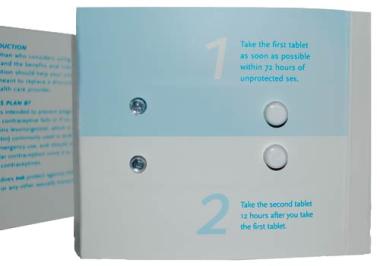Leslie Tarr Laurie was in a celebratory mood last week.
Laurie—president and CEO of Tapestry Health—was rejoicing over a recent federal court decision that reversed, in part, one of the many blows to reproductive rights delivered by the Bush administration. On March 23, Judge Edward R. Korman of New York's Federal District Court threw out a 2006 Food and Drug Administration rule that restricted the over-the-counter (OTC) sale of Plan B—the "morning-after pill" that can prevent unplanned pregnancy if taken shortly after a woman has unprotected sex—to women aged 18 or over. Instead, Korman ordered that the drug be made available, without prescription, to women as young as 17. The agency has 30 days to comply with the order.
That decision—shaving one year off the required age to get the drug OTC—might seem like a minor victory. While Korman also urged the FDA to consider removing all restrictions on OTC sales of the drug, he did not order the agency to do so.
But to Laurie and others who've long fought for reproductive rights, the ruling feels like a satisfying vindication of what they spent much of the previous eight years arguing: that under the Bush administration, science and public health concerns took a back seat to politics. In his decision, Korman slammed the FDA for allowing its decisions about Plan B to be shaped by pressure from the administration.
"What is just so exhilarating about this court decision is that the mischief that was done by the last administration, of intermingling politics and healthcare, is coming to an end," Laurie said.
*
Plan B has followed a rocky path since it was first introduced in the U.S. in the late 1990s.
The drug, which is manufactured by Barr Pharmaceuticals, is a heavy dose of the hormone progestin, used in birth control pills. If a woman takes Plan B within 72 hours of having unprotected sex—which could include scenarios ranging from broken condoms to sexual assaults—it can prevent pregnancy.
In 1999, the FDA approved the drug for use with a doctor's prescription. Public health organizations and women's rights groups promptly pushed for the drug to be made available over the counter, pointing to the short window of time a woman has to take the drug in order for it to be effective.
In 2004, the FDA rejected an application from Barr that would allow OTC sales of Plan B—a decision that flew in the face of the FDA's own advisory committee, which strongly recommended approval. The agency claimed its decision would protect young girls who might not know how to use the drug properly.
Barr subsequently filed a new application that would allow OTC sales to women aged 16 or over only. In 2006, the FDA ruled that the drug could be purchased over the counter, but only by women over age 18. In addition, the agency ordered that Plan B be kept behind the pharmacy counter, meaning that even an adult woman, who did not need a prescription, couldn't simply get the drug off the shelf, the way she could a box of condoms, but instead would have to ask a pharmacist.
That decision was challenged by the Center for Reproductive Rights, which filed the lawsuit on which Korman ruled. In his decision, Korman underscored what activists have long argued: that the FDA allowed pressure from the White House to shape its decisions about Plan B. "The FDA repeatedly and unreasonably delayed issuing a decision on Plan B for suspect reasons," he wrote.
The judge noted, for example, that FDA officials had deliberately sat on Barr's application, only taking it up when Sen. Patty Murray of Washington and then-Sen. Hillary Rodham Clinton of New York threatened to hold up confirmation hearings for an FDA commissioner. Korman also wrote that the agency had ignored positive reports about Plan B from its advisory panel and staff scientists and appointed anti-choice members to a panel reviewing the drug in an effort to kill Barr's application. One FDA official—Susan Wood, who had headed its Office of Women's Health—resigned in 2005 in protest against the agency's handling of Plan B.
*
Anti-choice groups are protesting Korman's ruling. The Family Research Council, a Christian think tank, has issued a statement charging that the decision "jeopardizes girls' health and the ability of parents to care for their daughters' physical and emotional well-being. Judge Korman has accepted lock, stock, and barrel all of the claims of a political ideology promoting sexual license for teens."
The FRC also contends that over-the-counter sales of Plan B will keep women from getting routine sexual health care from medical professionals. In addition, the group said, "There is a real danger that Plan B may be given to women, especially sexually abused women and minors, under coercion or without their consent."
At deadline, the FDA—now under the Obama administration—had yet to announce whether it will appeal Korman's ruling. Pro-choice activists might find cause for optimism in earlier Obama policy changes, including overturning bans on using federal money to fund embryonic stem cell research and to support international health organizations that offer abortion counseling. The administration is also considering ending a regulation, enacted under Bush, that allows medical professionals to refuse to offer abortion services if they personally object to the procedure.
Laurie is optimistic that other Bush-era reproductive rights policies will be coming to an end, starting with increased access to Plan B.
"I think we're seeing the light at the end of the tunnel for access to a safe way of ensuring that pregnancies happen when people want them to," she said. "It appears [we have] a new federal administration that wants science to trump politics."
Plan B is available at Tapestry's clinics throughout Western Mass. (for locations, go to www.tapestryhealth.org) on a sliding scale that starts at $20 a dose.



